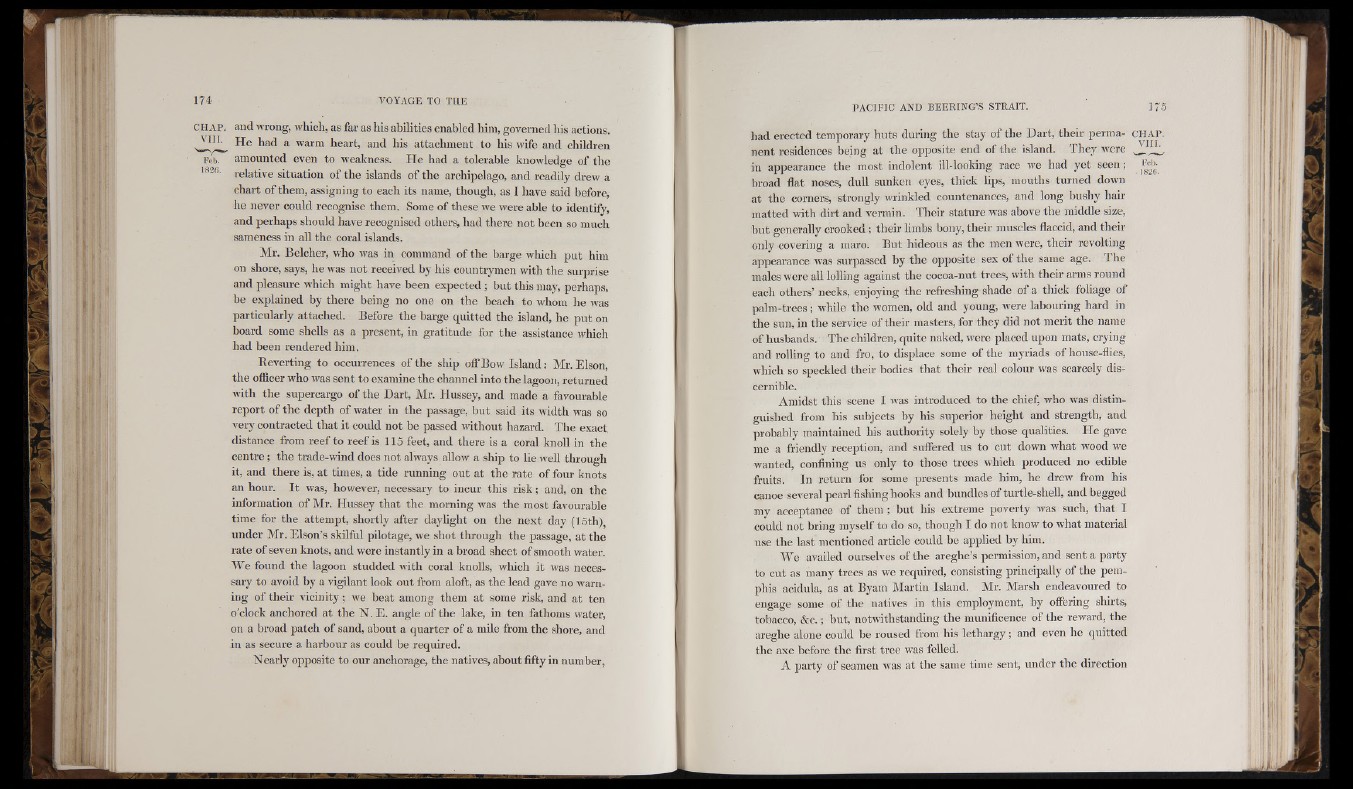
C H A P . and wrong, which, as far as his abilities enabled him, governed his actions.
H e had a warm heart, and his attachment to liis ivife and cliildren
Feb. amounted even to weakness. He had a tolerable knowledge of the
relative situation of tlie islands of the archipelago, and readily drew a
chart of them, assigning to each its name, though, as I have said before,
he never could recognise them. Some of these we were able to identify,
and perhaps should have recognised others, had there not been so miicli
sameness in all the coral islands.
Mr. Belcher, rvho was in command of the barge wliich put him
on shore, says, he was not received by his countrymen with the surprise
and pleasure which might have been expected; but this may, perhaps,
be explained by there being no one on the beach to whom he was
particularly attached. Before the barge quitted the island, he put on
board some shells as a present, in gratitude for the assistance which
had been rendered him.
Reverting to occurrences of the ship off Bow Island: Mr. Elson,
the officer who was sent to examine the channel into the lagoon, returned
with the supercargo of the Dart, Mr. Hussey, and made a favourable
report of the depth of water in the passage, but said its width was so
very contracted that it could not be passed without hazard. The exact
distance from reef to reef is 115 feet, and there is a coral knoll in the
centre; the trade-wind does not always allow a ship to lie wmll through
it, and there is, at times, a tide running out at the rate of four knots
an hour. It was, however, necessary to incur this risk; and, on the
information of Mr. Hussey that the morning was the most favourable
time for the attempt, shortly after daylight on the next day (loth),
under Mr. Elson’s skilful pilotage, we shot through the passage, at the
rate of seven knots, and were instantly in a broad sheet of smooth water.
We found the lagoon studded with coral knolls, which it was necessary
to avoid by a vigilant look out from aloft, as the lead gave no warning
of their vicinity; we beat among them at some risk, and at ten
o’clock anchored at the N .E . angle of the lake, in ten fathoms water,
on a broad patch of sand, about a quarter of a mile from the shore, and
in as secure a harbour as could be required.
Nearly opposite to our anchorage, the natives, about fifty in number,
had erected temporary huts during the stay of the Dart, their perma- cil.AI’.
nent residences being at the opposite end of the island. They w’ere
in appearance the most indolent ill-looking race we had yet se en;
broad flat noses, dull sunken eyes, thick lips, mouths turned donm
at the corners, strongly wrinkled countenances, and long bushy hair
matted with dirt and vermin. Their stature was above the middle size,
but generally crooked ; their limbs bony, their muscles flaccid, and their
only covering a maro. But hideous as the men were, tlieir revolting
appearance was surpassed by the opposite sex of the same age. The
males were all lolling against the cocoa-nut trees, with their arms round
each others’ necks, enjoying the refreshing shade of a thick foliage of
palm-trees; while the women, old and young, were labouring hard in
the sun, in the service of their masters, for they did not merit the name
of husbands. The children, quite naked, w’ere placed upon mats, crying
and rolling to and fro, to displace some of the myriads of house-flies,
whicli so speckled their bodies that their real colour was scarcely discernible.
Amidst this scene I was introduced to the chief, who was distinguished
from his subjects by his superior height and strength, and
probably maintained his authority solely by those qualities. He gave
me a friendly reception, and suffered us to cut down what wood we
wanted, confining us only to those trees which produced no edible
fruits. In return for some presents made him, he drew from his
canoe several pearl fishing hooks and bundles of turtle-shell, and begged
my acceptance of them ; but his extreme poverty was such, that 1
could not bring myself to do so, though I do not know to what material
use the last mentioned article could be applied by him.
YY"e availed ourselves of the areghe’s permission, and sent a party
to cut as many trees as w’e required, consisting principally of the pemphis
aciduhi, as at Byam Martin Island. Mr. Marsh endeavoured to
engage some of the natives in this employment, by offering shirts,
tobacco, &c.; but, notwithstanding the munificence of the vew'ard, the
areghe alone could be roused from liis lethargy ; and even he quitted
the axe before tlie first tree was felled.
A party of seamen was at tlie same time sent, under tlie direction